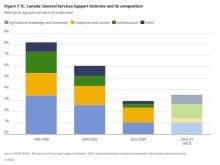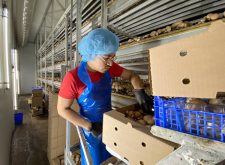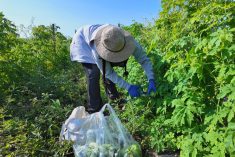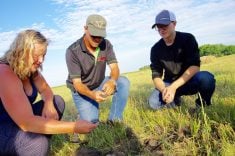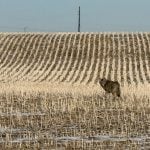Canada’s minister of agriculture and agri-food says she is working on building business cases for improvements to AgriStability and relief from carbon taxes on grain drying.
Marie-Claude Bibeau spoke to Farmtario in a year-end interview before Christmas.
Why it matters: There are several significant issues being dealt with by Bibeau and the outcomes will have an effect on farmers’ markets, profits and ability to manage risk.
Bibeau acknowledged that there have been previous studies of AgriStability, but the challenge at this point is that the program is shared with the provinces and not all of them believe they will be able to get increased funding for the program. She didn’t commit to federal funding increases yet either.
Read Also

Women who fed a nation
More than 40,000 young women supported the war effort between the 1940s and early 1950s, helping grow and harvest crops amid labour shortages. They were called Farmerettes.
AgriStability is part of the Canadian Agricultural Partnership (CAP), a five-year plan for the federal government and provinces to manage their agriculture programs. Governments are loath to open up that agreement once it is set.
However, few farmers make use of AgriStability – an insurance-type program which farmers and government pay into to manage drops in farm commodity pricing. When the current CAP program began the reference margin – the drop in farm income needed to trigger a payout – dropped from 85 per cent to 75 per cent, which means it rarely pays out. Farmers who have managed their risk, by diversifying their farms into other commodities like livestock, or taking out other types of private insurance, have been penalized by the program.
The provinces and federal government recently announced changes which would mean that AgriStability would pay out before private insurance.
“We want to look at the various tools,” she said. “Is the money put in the right program, for example? We want to do better, but we need to do it in the right way.”
The increased funding to enable the requested changes would be significant, says Bibeau, with the change from an 85 per cent reference margin to 75 per cent pegged at $400 million.
A panel of farmers, academics and actuaries produced a report on challenges with the business risk management (BRM) programs under CAP and an internal review has also been conducted by the government. More study is needed, says Bibeau, with the goal of having answers at the next federal-provincial-territorial meeting scheduled for June.
“Everybody wants to find a solution, that’s for sure,” she said, “but we do not all feel we have the same potential of getting more money. We have to find a common ground somewhere. To do that definitely we need more elements to build our case and make sure we are recommending the best approach. Next summer is coming fast and we really want to move fast.”
A solution next summer will be too late for farmers to make use of any changes in planning for the 2020 growing season.
Beef processing a concern
Bibeau says she is open to proposals on how to facilitate more beef processing capacity in Ontario.
Beef processing capacity was already tight in Ontario when the Canadian Food Inspection Agency cancelled the processing licence of Ryding Regency and some related companies after a long investigation during which the Toronto-based plant was closed down.
Bibeau says she had already acknowledged the shortage in processing across the country before the Ryding Regency shutdown occurred.
She says stimulating more processing capacity for food produced in Canada is a priority. She sees potential solutions in the government’s “ambition around Farm Credit Canada.”
Bibeau’s mandate letter from the prime minister instructs her to set a course toward a larger role for a new Farm and Food Development Canada agency that will have a larger mandate to help fund capacity through the agriculture and food system.
There’s no timeline yet for the new agency, she says, and there will be preliminary meetings in January. There are others to be consulted including other government agencies that would be affected by the new agency, such as Export Development Canada.
Carbon tax impact on grain drying
Bibeau says she is working to make a case for a crops drying exemption from the carbon tax. She says there are precedents, pointing to the reduced carbon tax for greenhouse heating and on farm fuel.
“Agriculture is touched differently than others. I have to build a case to demonstrate why it would be justified to provide a rebate,” she said.
Questions include the total impact on the sector, what the tax represents for an individual farm and if the effect is significant enough it could jeopardize the viability of a farm operation. She says she has asked the sector to provide her with data.
Mixed emotions on trade
Bibeau says the passage of new trade deals, such as the Canada-U.S.-Mexico Agreement that updates the North American Trade Agreement (NAFTA), is “extremely important,” especially in areas like pork. She says she has learned how integrated the North American pork sector is through her work on how to prevent and manage African swine fever.
However, she’s also from a strong dairy riding in Quebec and she has heard how the agreements will affect producers there. She says the government continues to work on compensation for dairy, along with poultry and egg producers, as a result of the impact of new trade agreements.
Happy to be back in the agriculture portfolio
Bibeau, who was first appointed as agriculture minister in March 2019, said she had hoped the prime minister would re-appoint her as agriculture minister after the October election in which the Liberals won a minority government.
She said she had just started to get relationships developed with agriculture across the country and wanted to continue to build them.
“We have an ambitious vision for the sector and I’m excited to work with them.”






